- Home
- Edith Wharton
Bunner Sisters Page 3
Bunner Sisters Read online
Page 3
After he had left both sisters remained silent for a while; then Evelina, laying aside her unfinished flower, said: "I'll go and lock up."
IV
INTOLERABLY monotonous seemed now to the Bunner sisters the treadmill routine of the shop, colourless and long their evenings about the lamp, aimless their habitual interchange of words to the weary accompaniment of the sewing and pinking machines.
It was perhaps with the idea of relieving the tension of their mood that Evelina, the following Sunday, suggested inviting Miss Mellins to supper. The Bunner sisters were not in a position to be lavish of the humblest hospitality, but two or three times in the year they shared their evening meal with a friend; and Miss Mellins, still flushed with the importance of her "turn," seemed the most interesting guest they could invite.
As the three women seated themselves at the supper-table, embellished by the unwonted addition of pound cake and sweet pickles, the dress-maker's sharp swarthy person stood out vividly between the neutral-tinted sisters. Miss Mellins was a small woman with a glossy yellow face and a frizz of black hair bristling with imitation tortoise-shell pins. Her sleeves had a fashionable cut, and half a dozen metal bangles rattled on her wrists. Her voice rattled like her bangles as she poured forth a stream of anecdote and ejaculation; and her round black eyes jumped with acrobatic velocity from one face to another. Miss Mellins was always having or hearing of amazing adventures. She had surprised a burglar in her room at midnight (though how he got there, what he robbed her of, and by what means he escaped had never been quite clear to her auditors); she had been warned by anonymous letters that her grocer (a rejected suitor) was putting poison in her tea; she had a customer who was shadowed by detectives, and another (a very wealthy lady) who had been arrested in a department store for kleptomania; she had been present at a spiritualist seance where an old gentleman had died in a fit on seeing a materialization of his mother-in-law; she had escaped from two fires in her night-gown, and at the funeral of her first cousin the horses attached to the hearse had run away and smashed the coffin, precipitating her relative into an open man-hole before the eyes of his distracted family.
A sceptical observer might have explained Miss Mellins's proneness to adventure by the fact that she derived her chief mental nourishment from the Police Gazette and the Fireside Weekly; but her lot was cast in a circle where such insinuations were not likely to be heard, and where the title-role in blood-curdling drama had long been her recognized right.
"Yes," she was now saying, her emphatic eyes on Ann Eliza, "you may not believe it, Miss Bunner, and I don't know's I should myself if anybody else was to tell me, but over a year before ever I was born, my mother she went to see a gypsy fortune- teller that was exhibited in a tent on the Battery with the green- headed lady, though her father warned her not to--and what you s'pose she told her? Why, she told her these very words--says she: 'Your next child'll be a girl with jet-black curls, and she'll suffer from spasms.'"
"Mercy!" murmured Ann Eliza, a ripple of sympathy running down her spine.
"D'you ever have spasms before, Miss Mellins?" Evelina asked.
"Yes, ma'am," the dress-maker declared. "And where'd you suppose I had 'em? Why, at my cousin Emma McIntyre's wedding, her that married the apothecary over in Jersey City, though her mother appeared to her in a dream and told her she'd rue the day she done it, but as Emma said, she got more advice than she wanted from the living, and if she was to listen to spectres too she'd never be sure what she'd ought to do and what she'd oughtn't; but I will say her husband took to drink, and she never was the same woman after her fust baby--well, they had an elegant church wedding, and what you s'pose I saw as I was walkin' up the aisle with the wedding percession?"
"Well?" Ann Eliza whispered, forgetting to thread her needle.
"Why, a coffin, to be sure, right on the top step of the chancel--Emma's folks is 'piscopalians and she would have a church wedding, though his mother raised a terrible rumpus over it- -well, there it set, right in front of where the minister stood that was going to marry 'em, a coffin covered with a black velvet pall with a gold fringe, and a 'Gates Ajar' in white camellias atop of it."
"Goodness," said Evelina, starting, "there's a knock!"
"Who can it be?" shuddered Ann Eliza, still under the spell of Miss Mellins's hallucination.
Evelina rose and lit a candle to guide her through the shop. They heard her turn the key of the outer door, and a gust of night air stirred the close atmosphere of the back room; then there was a sound of vivacious exclamations, and Evelina returned with Mr. Ramy.
Ann Eliza's heart rocked like a boat in a heavy sea, and the dress-maker's eyes, distended with curiosity, sprang eagerly from face to face.
"I just thought I'd call in again," said Mr. Ramy, evidently somewhat disconcerted by the presence of Miss Mellins. "Just to see how the clock's behaving," he added with his hollow-cheeked smile.
"Oh, she's behaving beautiful," said Ann Eliza; "but we're real glad to see you all the same. Miss Mellins, let me make you acquainted with Mr. Ramy."
The dress-maker tossed back her head and dropped her lids in condescending recognition of the stranger's presence; and Mr. Ramy responded by an awkward bow. After the first moment of constraint a renewed sense of satisfaction filled the consciousness of the three women. The Bunner sisters were not sorry to let Miss Mellins see that they received an occasional evening visit, and Miss Mellins was clearly enchanted at the opportunity of pouring her latest tale into a new ear. As for Mr. Ramy, he adjusted himself to the situation with greater ease than might have been expected, and Evelina, who had been sorry that he should enter the room while the remains of supper still lingered on the table, blushed with pleasure at his good-humored offer to help her "glear away."
The table cleared, Ann Eliza suggested a game of cards; and it was after eleven o'clock when Mr. Ramy rose to take leave. His adieux were so much less abrupt than on the occasion of his first visit that Evelina was able to satisfy her sense of etiquette by escorting him, candle in hand, to the outer door; and as the two disappeared into the shop Miss Mellins playfully turned to Ann Eliza.
"Well, well, Miss Bunner," she murmured, jerking her chin in the direction of the retreating figures, "I'd no idea your sister was keeping company. On'y to think!"
Ann Eliza, roused from a state of dreamy beatitude, turned her timid eyes on the dress-maker.
"Oh, you're mistaken, Miss Mellins. We don't har'ly know Mr. Ramy."
Miss Mellins smiled incredulously. "You go 'long, Miss Bunner. I guess there'll be a wedding somewheres round here before spring, and I'll be real offended if I ain't asked to make the dress. I've always seen her in a gored satin with rooshings."
Ann Eliza made no answer. She had grown very pale, and her eyes lingered searchingly on Evelina as the younger sister re- entered the room. Evelina's cheeks were pink, and her blue eyes glittered; but it seemed to Ann Eliza that the coquettish tilt of her head regrettably emphasized the weakness of her receding chin. It was the first time that Ann Eliza had ever seen a flaw in her sister's beauty, and her involuntary criticism startled her like a secret disloyalty.
That night, after the light had been put out, the elder sister knelt longer than usual at her prayers. In the silence of the darkened room she was offering up certain dreams and aspirations whose brief blossoming had lent a transient freshness to her days. She wondered now how she could ever have supposed that Mr. Ramy's visits had another cause than the one Miss Mellins suggested. Had not the sight of Evelina first inspired him with a sudden solicitude for the welfare of the clock? And what charms but Evelina's could have induced him to repeat his visit? Grief held up its torch to the frail fabric of Ann Eliza's illusions, and with a firm heart she watched them shrivel into ashes; then, rising from her knees full of the chill joy of renunciation, she laid a kiss on the crimping pins of the sleeping Evelina and crept under the bedspread at her side.
V
DURING the months that followed,
Mr. Ramy visited the sisters with increasing frequency. It became his habit to call on them every Sunday evening, and occasionally during the week he would find an excuse for dropping in unannounced as they were settling down to their work beside the lamp. Ann Eliza noticed that Evelina now took the precaution of putting on her crimson bow every evening before supper, and that she had refurbished with a bit of carefully washed lace the black silk which they still called new because it had been bought a year after Ann Eliza's.
Mr. Ramy, as he grew more intimate, became less conversational, and after the sisters had blushingly accorded him the privilege of a pipe he began to permit himself long stretches of meditative silence that were not without charm to his hostesses. There was something at once fortifying and pacific in the sense of that tranquil male presence in an atmosphere which had so long quivered with little feminine doubts and distresses; and the sisters fell into the habit of saying to each other, in moments of uncertainty: "We'll ask Mr. Ramy when he comes," and of accepting his verdict, whatever it might be, with a fatalistic readiness that relieved them of all responsibility.
When Mr. Ramy drew the pipe from his mouth and became, in his turn, confidential, the acuteness of their sympathy grew almost painful to the sisters. With passionate participation they listened to the story of his early struggles in Germany, and of the long illness which had been the cause of his recent misfortunes. The name of the Mrs. Hochmuller (an old comrade's widow) who had nursed him through his fever was greeted with reverential sighs and an inward pang of envy whenever it recurred in his biographical monologues, and once when the sisters were alone Evelina called a responsive flush to Ann Eliza's brow by saying suddenly, without the mention of any name: "I wonder what she's like?"
One day toward spring Mr. Ramy, who had by this time become as much a part of their lives as the letter-carrier or the milkman, ventured the suggestion that the ladies should accompany him to an exhibition of stereopticon views which was to take place at Chickering Hall on the following evening.
After their first breathless "Oh!" of pleasure there was a silence of mutual consultation, which Ann Eliza at last broke by saying: "You better go with Mr. Ramy, Evelina. I guess we don't both want to leave the store at night."
Evelina, with such protests as politeness demanded, acquiesced in this opinion, and spent the next day in trimming a white chip bonnet with forget-me-nots of her own making. Ann Eliza brought out her mosaic brooch, a cashmere scarf of their mother's was taken from its linen cerements, and thus adorned Evelina blushingly departed with Mr. Ramy, while the elder sister sat down in her place at the pinking-machine.
It seemed to Ann Eliza that she was alone for hours, and she was surprised, when she heard Evelina tap on the door, to find that the clock marked only half-past ten.
"It must have gone wrong again," she reflected as she rose to let her sister in.
The evening had been brilliantly interesting, and several striking stereopticon views of Berlin had afforded Mr. Ramy the opportunity of enlarging on the marvels of his native city.
"He said he'd love to show it all to me!" Evelina declared as Ann Eliza conned her glowing face. "Did you ever hear anything so silly? I didn't know which way to look."
Ann Eliza received this confidence with a sympathetic murmur.
"My bonnet is becoming, isn't it?" Evelina went on irrelevantly, smiling at her reflection in the cracked glass above the chest of drawers.
"You're jest lovely," said Ann Eliza.
Spring was making itself unmistakably known to the distrustful New Yorker by an increased harshness of wind and prevalence of dust, when one day Evelina entered the back room at supper-time with a cluster of jonquils in her hand.
"I was just that foolish," she answered Ann Eliza's wondering glance, "I couldn't help buyin' 'em. I felt as if I must have something pretty to look at right away."
"Oh, sister," said Ann Eliza, in trembling sympathy. She felt that special indulgence must be conceded to those in Evelina's state since she had had her own fleeting vision of such mysterious longings as the words betrayed.
Evelina, meanwhile, had taken the bundle of dried grasses out of the broken china vase, and was putting the jonquils in their place with touches that lingered down their smooth stems and blade- like leaves.
"Ain't they pretty?" she kept repeating as she gathered the flowers into a starry circle. "Seems as if spring was really here, don't it?"
Ann Eliza remembered that it was Mr. Ramy's evening.
When he came, the Teutonic eye for anything that blooms made him turn at once to the jonquils.
"Ain't dey pretty?" he said. "Seems like as if de spring was really here."
"Don't it?" Evelina exclaimed, thrilled by the coincidence of their thought. "It's just what I was saying to my sister."
Ann Eliza got up suddenly and moved away; she remembered that she had not wound the clock the day before. Evelina was sitting at the table; the jonquils rose slenderly between herself and Mr. Ramy.
"Oh," she murmured with vague eyes, "how I'd love to get away somewheres into the country this very minute--somewheres where it was green and quiet. Seems as if I couldn't stand the city another day." But Ann Eliza noticed that she was looking at Mr. Ramy, and not at the flowers.
"I guess we might go to Cendral Park some Sunday," their visitor suggested. "Do you ever go there, Miss Evelina?"
"No, we don't very often; leastways we ain't been for a good while." She sparkled at the prospect. "It would be lovely, wouldn't it, Ann Eliza?"
"Why, yes," said the elder sister, coming back to her seat.
"Well, why don't we go next Sunday?" Mr. Ramy continued. "And we'll invite Miss Mellins too--that'll make a gosy little party."
That night when Evelina undressed she took a jonquil from the vase and pressed it with a certain ostentation between the leaves of her prayer-book. Ann Eliza, covertly observing her, felt that Evelina was not sorry to be observed, and that her own acute consciousness of the act was somehow regarded as magnifying its significance.
The following Sunday broke blue and warm. The Bunner sisters were habitual church-goers, but for once they left their prayer- books on the what-not, and ten o'clock found them, gloved and bonneted, awaiting Miss Mellins's knock. Miss Mellins presently appeared in a glitter of jet sequins and spangles, with a tale of having seen a strange man prowling under her windows till he was called off at dawn by a confederate's whistle; and shortly afterward came Mr. Ramy, his hair brushed with more than usual care, his broad hands encased in gloves of olive-green kid.
The little party set out for the nearest street-car, and a flutter of mingled gratification and embarrassment stirred Ann Eliza's bosom when it was found that Mr. Ramy intended to pay their fares. Nor did he fail to live up to this opening liberality; for after guiding them through the Mall and the Ramble he led the way to a rustic restaurant where, also at his expense, they fared idyllically on milk and lemon-pie.
After this they resumed their walk, strolling on with the slowness of unaccustomed holiday-makers from one path to another-- through budding shrubberies, past grass-banks sprinkled with lilac crocuses, and under rocks on which the forsythia lay like sudden sunshine. Everything about her seemed new and miraculously lovely to Ann Eliza; but she kept her feelings to herself, leaving it to Evelina to exclaim at the hepaticas under the shady ledges, and to Miss Mellins, less interested in the vegetable than in the human world, to remark significantly on the probable history of the persons they met. All the alleys were thronged with promenaders and obstructed by perambulators; and Miss Mellins's running commentary threw a glare of lurid possibilities over the placid family groups and their romping progeny.
Ann Eliza was in no mood for such interpretations of life; but, knowing that Miss Mellins had been invited for the sole purpose of keeping her company she continued to cling to the dress- maker's side, letting Mr. Ramy lead the way with Evelina. Miss Mellins, stimulated by the excitement of the occasion, grew more and more discursive, and her
ceaseless talk, and the kaleidoscopic whirl of the crowd, were unspeakably bewildering to Ann Eliza. Her feet, accustomed to the slippered ease of the shop, ached with the unfamiliar effort of walking, and her ears with the din of the dress-maker's anecdotes; but every nerve in her was aware of Evelina's enjoyment, and she was determined that no weariness of hers should curtail it. Yet even her heroism shrank from the significant glances which Miss Mellins presently began to cast at the couple in front of them: Ann Eliza could bear to connive at Evelina's bliss, but not to acknowledge it to others.
At length Evelina's feet also failed her, and she turned to suggest that they ought to be going home. Her flushed face had grown pale with fatigue, but her eyes were radiant.
The return lived in Ann Eliza's memory with the persistence of an evil dream. The horse-cars were packed with the returning throng, and they had to let a dozen go by before they could push their way into one that was already crowded. Ann Eliza had never before felt so tired. Even Miss Mellins's flow of narrative ran dry, and they sat silent, wedged between a negro woman and a pock- marked man with a bandaged head, while the car rumbled slowly down a squalid avenue to their corner. Evelina and Mr. Ramy sat together in the forward part of the car, and Ann Eliza could catch only an occasional glimpse of the forget-me-not bonnet and the clock-maker's shiny coat-collar; but when the little party got out at their corner the crowd swept them together again, and they walked back in the effortless silence of tired children to the Bunner sisters' basement. As Miss Mellins and Mr. Ramy turned to go their various ways Evelina mustered a last display of smiles; but Ann Eliza crossed the threshold in silence, feeling the stillness of the little shop reach out to her like consoling arms.

 The Age of Innocence
The Age of Innocence The Reef
The Reef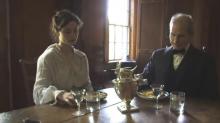 Summer
Summer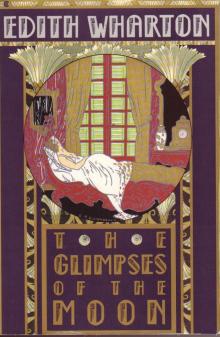 The Glimpses of the Moon
The Glimpses of the Moon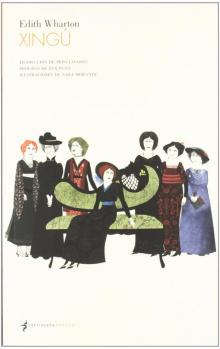 Xingu
Xingu The Fruit of the Tree
The Fruit of the Tree Fast and Loose
Fast and Loose Artemis to Actaeon and Other Verse
Artemis to Actaeon and Other Verse The Line of Least Resistance
The Line of Least Resistance The Lamp of Psyche
The Lamp of Psyche The Reckoning
The Reckoning Afterward
Afterward The New York Stories of Edith Wharton
The New York Stories of Edith Wharton The 2014 Halloween Horrors Megapack
The 2014 Halloween Horrors Megapack 'Copy': A Dialogue
'Copy': A Dialogue The Recovery
The Recovery The Fulness of Life
The Fulness of Life Early Short Stories Vol. 1
Early Short Stories Vol. 1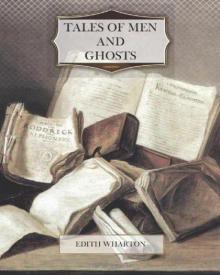 Tales of Men and Ghosts
Tales of Men and Ghosts The House of the Dead Hand
The House of the Dead Hand That Good May Come
That Good May Come The Buccaneers
The Buccaneers Other Times, Other Manners
Other Times, Other Manners The Hermit and the Wild Woman
The Hermit and the Wild Woman Kerfol
Kerfol The Duchess at Prayer
The Duchess at Prayer Bunner Sisters
Bunner Sisters The Choice
The Choice Madame De Treymes
Madame De Treymes Ethan Frome, Summer, Bunner Sisters
Ethan Frome, Summer, Bunner Sisters In Morocco
In Morocco The Valley of Decision
The Valley of Decision Age of Innocence (Barnes & Noble Classics Series)
Age of Innocence (Barnes & Noble Classics Series) The Angel at the Grave
The Angel at the Grave April Showers
April Showers Sanctuary
Sanctuary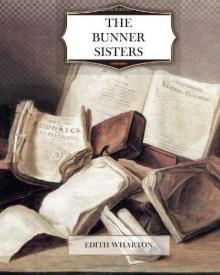 The Bunner Sisters
The Bunner Sisters Mrs. Manstey's View
Mrs. Manstey's View Writing a War Story
Writing a War Story The Custom of the Country
The Custom of the Country In Trust
In Trust The Triumph of the Night
The Triumph of the Night The Hermit and the Wild Woman, and Other Stories
The Hermit and the Wild Woman, and Other Stories Roman Fever and Other Stories
Roman Fever and Other Stories The Mission of Jane
The Mission of Jane The Descent of Man and Other Stories
The Descent of Man and Other Stories Coming Home
Coming Home The Touchstone
The Touchstone Early Short Stories Vol. 2
Early Short Stories Vol. 2 Edith Wharton's Verse, 1879-1919, from various journals.
Edith Wharton's Verse, 1879-1919, from various journals.